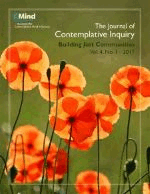Journal of Contemplative Inquiry
Volume 4, Number 1 (2017) Building Just Communities
Contemplative practices are often described as inwardly-focused forms of self-inquiry and reflection that foster intrapersonal development. Contemplative practices can also develop and sustain greater interpersonal connection and allow an increased understanding of the implications of the systems in which we interact. For this issue, JOCI sought papers that investigate these connections and explore how ethical, compassionate, and more socially just communities in higher education can be nurtured through contemplative approaches that recognize and honor difference, with a commitment to the common flourishing of all.Building Just Communities
Trudy Sable and David Sable
“Learning How to See”: Faculty Members’ Use of Unnamed Contemplative Practices
Ameena Batada, Keith Chichester, Melissa J. Himelein, and Richard Chess
Assessing the Authentic Knower Through Contemplative Arts-Based Pedagogies In Qualitative Inquiry
Kakali Bhattacharya and Meaghan Cochrane
The Mindful Campus: Organizational Structure and Culture
Linda Coutant and Karen Caldwell
Interfaith Dialogue: The Art of Listening
Mary Keator, Warren J. Savage, Alessa Foley, Matthew Furtado, Jessica Gray, Hibo Hussein, and Meytal Raikhman
Correspondence: Sitting and Reading as Two Routes to Community
Donald McCown and Josie Billington
A Contemplative Look at Social Change: Awareness and Community as Foundations for Leading
Lisa Napora
Practicing Contemplative Gratitude in University Classrooms: Student Learning and Happiness Outcomes
Carey Marie Noland, Cigdem Talgar, Jesica Speed-Wiley, and Jacob Depue
Navigating Stress: Graduate Student
Experiences with Contemplative Practices
in a Foreign Language Teacher Education
Course
Emily E. Scida and Jill N. Jones

